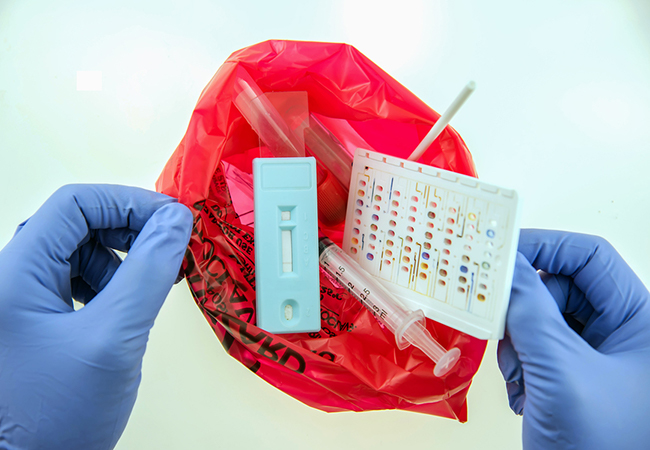Safe and Secure: The Conclusive Choice for Expert Medical Waste Removal Services
Safe and Secure: The Conclusive Choice for Expert Medical Waste Removal Services
Blog Article
Discovering Different Waste Disposal Options for a Cleaner Atmosphere
In the quest of a cleaner atmosphere, the administration of waste disposal has actually emerged as an essential focal point for sustainable growth. With a wide variety of waste disposal options offered, varying from conventional garbage dump approaches to innovative waste-to-energy technologies, the option of how we handle our waste has significant ramifications for our world's well-being.
Recycling Techniques
Executing reliable recycling techniques is vital in minimizing waste and promoting sustainability in our setting. Reusing entails the process of converting waste materials into multiple-use challenge stop unnecessary disposal. Among the most usual recycling methods is worldly recuperation, where products like paper, glass, plastic, and metal are collected, arranged, and refined to develop new items. This process not just conserves all-natural sources yet additionally reduces power intake and greenhouse gas discharges associated with generating new materials from square one.
An additional essential recycling technique is composting, which involves decaying organic waste like food scraps and backyard trimmings into nutrient-rich soil. By incorporating these different recycling approaches right into our waste administration methods, we can dramatically minimize our ecological impact and relocate in the direction of an extra lasting future.

Composting Methods
Efficient waste administration practices, such as reusing approaches, lead the way for a cleaner setting, and now, changing the emphasis to 'Composting Techniques', we discover lasting ways to decompose natural waste for ecological benefit. medical waste disposal.
Composting is a natural process that changes organic waste, like food scraps and yard trimmings, right into a nutrient-rich dirt modification. The trick to successful composting hinges on developing the ideal balance of green materials, such as vegetables and fruit scraps, and brown products, like dried out fallen leaves and twigs. These products disintegrate with the assistance of bacteria, damaging down the waste into valuable garden compost.
There are various composting methods readily available to suit various requirements. Traditional backyard composting includes layering organic materials in a container or stack and consistently turning the blend to freshen it. Vermicomposting, on the other hand, makes use of worms to damage down raw material right into compost (click here). For those with minimal room, interior composting systems provide a hassle-free solution. By utilizing composting strategies, we can decrease the quantity of waste sent out to landfills while producing a helpful product for enriching dirt and sustaining plant development.
Incineration Advantages And Disadvantages
Incineration, as a garbage disposal approach, provides both advantages and negative aspects that merit careful factor to consider in the world of lasting waste management techniques. On the positive side, incineration can significantly decrease the volume of waste, reducing the need for landfill area and potentially lowering greenhouse gas discharges. Incineration likewise enables for the recuperation of energy with the generation of electrical energy or warm, contributing to resource recovery. Additionally, the procedure can be made use of to destroy dangerous compounds, supplying a secure method for handling certain kinds of waste that may present dangers to public health and the environment if left without treatment.
In addition, the high preliminary financial investment and functional prices of incineration facilities present financial difficulties, making it a less cost-efficient alternative compared to various other waste administration techniques. view publisher site Cautious surveillance and guideline are necessary to reduce these unfavorable influences and maximize the advantages of incineration as part of a comprehensive waste management strategy.
Garbage Dump Management Techniques
Land fills play a crucial function in waste management and ecological preservation by giving a control system for the disposal of strong waste products. By condensing the waste, the quantity is minimized, permitting for more waste to be fit over time.
In addition, the application of day-to-day cover techniques is essential in minimizing smells, protecting against clutter, and reducing the destination of insects. Covering the disposed waste at the end of daily aids to include odors and stop potential environmental contamination. In addition, the monitoring of land fill gas discharges and leachate degrees is vital in making sure that environmental requirements are met and that any prospective dangers to bordering ecosystems are decreased.

Waste-to-Energy Technologies
One of the innovative strategies to squander management entails taking advantage of Waste-to-Energy technologies to transform strong waste right into functional energy resources. Waste-to-Energy (WtE) modern technologies include a series of procedures that intend to draw out power from waste products via thermal, chemical, or organic ways. This conversion process not only minimizes the volume of waste that winds up in garbage dumps but likewise generates important energy resources such as electrical power, warmth, or biofuels.
Incineration involves burning waste at high temperature levels to produce warm and electrical power. Gasification transforms waste right into a syngas, which can be used for power generation or chemical production.
Implementing Waste-to-Energy modern technologies can aid alleviate ecological concerns related to conventional waste disposal methods while all at once supplying an eco-friendly energy source. Careful consideration must be offered to exhausts control and guaranteeing the sustainability of feedstock products for these technologies to be truly helpful for a cleaner setting.

Verdict
Finally, discovering different garbage disposal options such as reusing, composting, incineration, landfill administration, and waste-to-energy innovations is crucial for promoting a cleaner environment - click here. Each approach has its own benefits and challenges, however by making use of a combination of these methods, we can work in the direction of reducing the amount of waste that ends up in land fills and ultimately add to a more sustainable future for generations ahead
With a wide variety of waste disposal options offered, varying from traditional garbage dump approaches to innovative waste-to-energy technologies, the choice of exactly how we manage our waste has significant effects for our earth's health. medical waste removal.Incineration, as a waste disposal approach, offers both advantages and negative aspects that merit careful factor to consider in the world of lasting waste administration techniques.Landfills play a vital function in waste monitoring and environmental conservation by giving a control system for the disposal of solid waste products. By condensing the waste, the quantity is minimized, enabling for even more waste to be accommodated over time
One of the cutting-edge methods to lose administration involves using Waste-to-Energy technologies to convert solid waste into functional energy sources.
Report this page